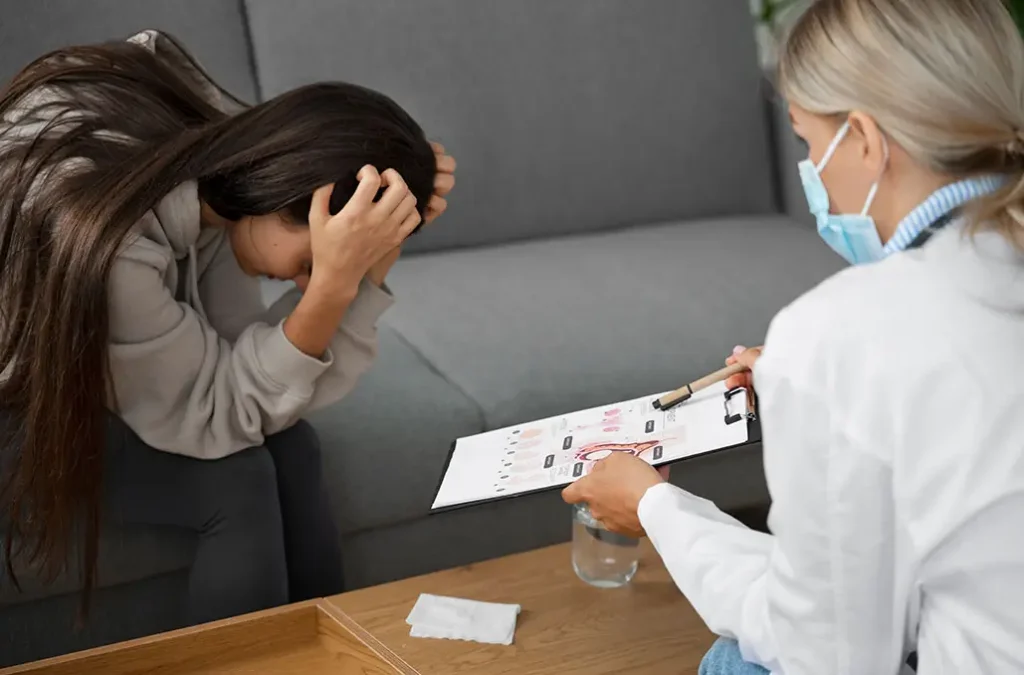Treatment for your Meth Addiction
Expert care in New Jersey for the fastest & lasting recovery
Request a Callback
Meth Addiction Treatment
In the U.S., approximately 1.6 million adults reported using methamphetamine in the past year. Typically found as a white powder or crystal-like substance, meth is commonly smoked, injected, swallowed, or snorted. Meth addiction can profoundly affect both individuals and their loved ones, often leading to intense cravings, mood swings, and paranoia, with severe personal and social consequences.
Meth is one of the most problematic drugs to quit, and professional help is required for lasting recovery, as quitting alone is rarely effective. The most effective treatments for meth addiction are behavioral therapies like cognitive-behavioral therapy and contingency management. Let’s discuss which treatment for meth addiction works best for you and how Relevance Recovery can support you on your journey.


How Does Meth Addiction Start?
Meth addiction often starts with casual or experimental use, but it can quickly escalate into a dangerous cycle of dependence. The pattern usually begins with repeated use, where each dose increases the desire to consume more.
Over time, a person may experience a powerful urge to keep seeking meth, even as tolerance builds. This means they need more of the drug to feel the same effects, but ironically, each dose may bring less pleasure than before.
This cycle of increased use and reduced satisfaction can make it incredibly difficult to break accessible as the addiction takes hold and intensifies. If this is the situation with you, seek treatment for the meth addiction.
Side Effects of Meth Use

Euphoria

Increased energy

Agitation

Increased alertness

Lack of appetite

Racing heartbeat

Hallucinations

Paranoia

Confusion
Side Effects from Long-Term Meth Use
- Long-term meth use can lead to serious physical health issues, including heart disease, breathing problems, and dental issues, often referred to as “meth mouth.” These health changes can affect how you see yourself and your confidence.
- You may experience mental health effects such as anxiety, depression, and paranoia, which can create an overwhelming emotional burden.
- As your tolerance increases, addiction can trap you in a cycle of dependence, making it feel nearly impossible to break free.
- Meth use often strains your relationships with family and friends, leading to feelings of loneliness and isolation. It can be painful to see loved ones pull away.
- Engaging in illegal activities to obtain meth can result in serious legal problems, adding stress and fear to your life.
Recognizing these consequences is essential. It’s not just about the drug; it’s about reclaiming your life, health, and relationships. Recovery Relevance is New Jersey’s leading Rehab to help you at the first step toward healing and a brighter future.


Active Meth Addiction Treatment That Fits Your Need
In New Jersey, you can engage in a rehab program where the core of active meth addiction treatment is behavioral psychotherapy. This therapy helps you make practical changes in your behavior and positive adjustments in your thinking and emotional responses.
Many individuals in meth rehab participate in cognitive-behavioral therapy (CBT). Other options may include:
- Contingency management interventions.
- Motivational incentive programs.
- Family therapy.
You might also benefit from the Matrix Model, which combines various recovery support methods.
Currently, medication plays a minor role in treating meth addiction, but researchers are exploring promising medication options that may be effective in the future. Contact Relevance professionals to explore your options for active Meth Addiction Treatment in New Jersey.
We Work With Most Major Insurance Providers
- Aetna
- Amerihealth
- Anthem
- Beacon
- Behavioral Health Systems
- BCBS—Most BlueCross & BlueShield Plans
- Carelon Behavioral Health
- CareFirst
- Cigna
- ComPsych
- Coventry
- Empire BlueCross BlueShield
- GHI
- Highmark
- Humana
- Magellan
- MagnaCare
- Meritain Health
- MultPlan
- NYSHIP (New York State Insurance Plan)
- Optum
- Oxford
- PHCS
- Self-Pay
- TRICARE
- UHC
- UMR
- VA Insurance
- 90 Degree Benefits
- Aetna
- Amerihealth
- Anthem
- Beacon
- Behavioral Health Systems
- BCBS—Most BlueCross & BlueShield Plans
- Carelon Behavioral Health
- CareFirst
- Cigna
- ComPsych
- Coventry
- Empire BlueCross BlueShield
- GHI
- Highmark
- Humana
- Magellan
- MagnaCare
- Meritain Health
- MultPlan
- NYSHIP (New York State Insurance Plan)
- Optum
- Oxford
- PHCS
- Self-Pay
- TRICARE
- UHC
- UMR
- VA Insurance
- 90 Degree Benefits
At this time, we do not accept Medicaid or Medicare.
Relevance saved my life. Everyone here is so helpful and genuine. I highly highly recommend!
This program was absolutely life changing. It fully brought me out of a dark tunnel and into a fresh perspective of enlightenment.
Coming from another treatment center from southern Jersey, I was really anxious and afraid, being completely out of my element, it felt like I was a fish out of water. Relevance’s team really made me feel comfortable while I was being treated, and I thank them for that. I felt really supported and cared for during the time I attended program!
Grateful for Relevance and their open door to seek the treatment I needed.
Great place! All the people are friendly and the staff helped me greatly in my recovery.
This place is a wonderful place to better yourself if you’re looking for a place that still feels like reality. You are not isolated from the rest of the world, but working on yourself within it. Most of the employees here really make an effort to help you, and the atmosphere is wonderful! I’m so greatful for this place
Relevance was such a welcoming environment every day. Staff was amazing supportive and caring. Definitely helped me prepare for life after treatment.
Dual Diagnosis & Meth Addiction Treatment
Dual diagnosis can affect anyone struggling with meth addiction. This means that along with addiction, you might also be dealing with another mental health issue. Recovering from dual diagnosis can be challenging, but it’s possible with a comprehensive treatment for meth addiction that focuses on your overall well-being, not just your meth use.
At Relevance, our knowledgeable staff is here to help you understand your situation and guide you on your journey to recovery. Don’t hesitate to seek support—you deserve the best care tailored to your needs.

Relevance Recovery: Meth Addiction Treatment New Jersey
If you’re seeking a meth rehab provider in New Jersey, Relevance Recovery is here to support you every step of the way. We offer both inpatient and outpatient treatment for meth addiction, tailored to meet your specific needs and recovery goals. Our compassionate approach aims to help you regain stability and confidence in your life, providing a safe and supportive environment for healing.
At Relevance Recovery, we understand that each individual’s journey through recovery is unique. Our experienced clinical team is dedicated to meeting you where you are, crafting personalized treatment plans for meth addiction in New Jersey that address your physical, mental, and emotional needs. Our comprehensive programs integrate a wide range of therapeutic approaches designed to help you rebuild connections with yourself and others, countering the isolation often associated with substance use.
Our facilities offer various therapies to support immediate recovery and long-term wellness. Whether you opt for immersive inpatient care or flexible outpatient treatment for meth addiction, Relevance Recovery is committed to guiding you toward a healthier, fulfilling future. Take the first step toward healing today—contact Relevance Recovery online, by phone, or by email.



